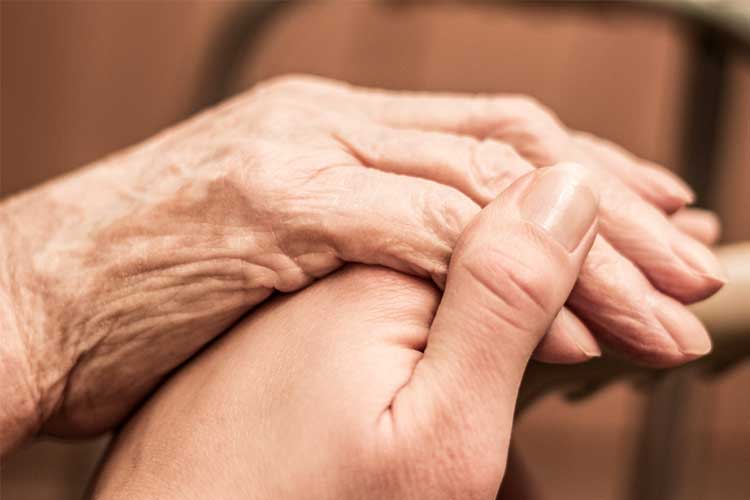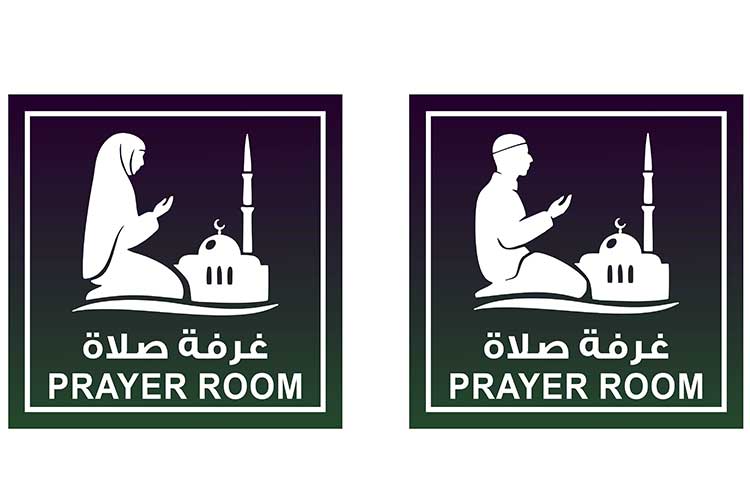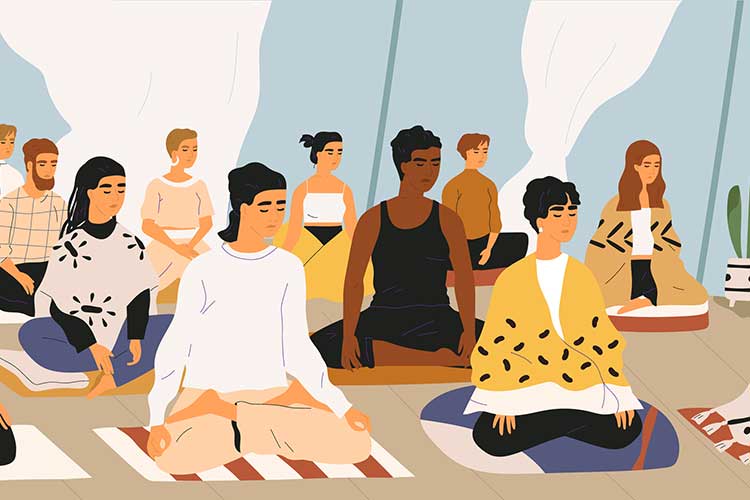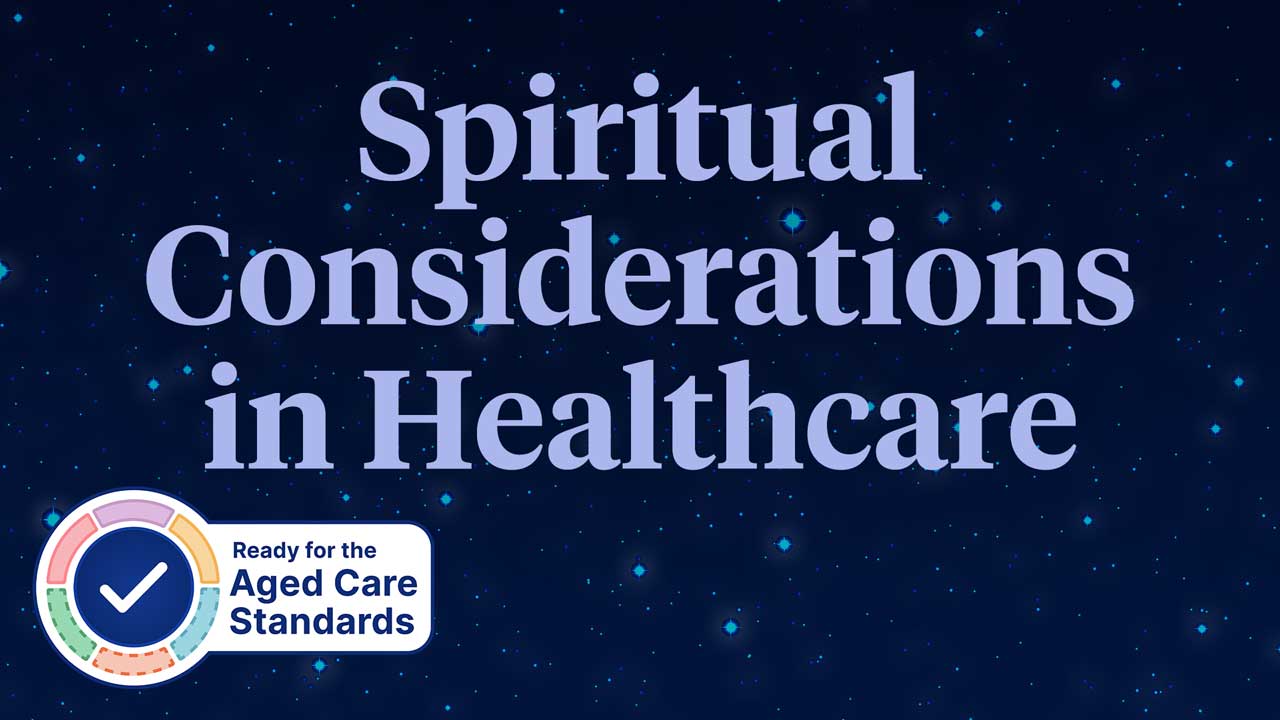In the wake of an illness or injury, the role of spirituality in a person's life is likely only to intensify and make itself more apparent.
It’s every person's right to maintain their identity and expect inclusive care throughout their patient journey. This article is intended to help you to navigate conversations and requests regarding your patient's spiritual beliefs.
Spirituality Defined
Spirituality is distinct from religion. Rather than an organised system of beliefs, spirituality is more of an intangible set of ideas that allows individuals to conceive of the world and their place in it (Dossey & Keegan 2013).
While for some, spirituality may be tied to their religion, many people do not express their spirituality within a religious tradition. Conversely, religious practices do not necessarily indicate a person's spirituality.
Spirituality recognises that a person's role and place in life have a greater value than what they do daily. It can relieve them from dependence on material things and help them to realise their life's greater purpose (ReachOut Australia 2022).
Why Does Spirituality Matter?
Broadly speaking, a primary goal of holistic care is to know and care for a patient in their complexity and wholeness.
Remember, a patient’s spiritual needs are closely linked to their physical, emotional, and social needs (Marie Curie 2022).
Spirituality Under the Strengthened Aged Care Quality Standards
Standard 1: The Person - Outcome 1.1 Person-centred care (Action 1.1.1) of the strengthened Aged Care Quality Standards requires staff to interact with older people in a way that makes them feel safe, welcome, included, and understood - naturally, this involves considering and respecting their spirituality (ACQSC 2024).
Furthermore, Action 1.1.2 requires aged care providers to have systems in place to assess an older person’s background, culture, diversity, beliefs, and life experiences and use these factors to inform their care and services (ACQSC 2024).
How is Spirituality Linked to Health?
Studies conducted to explore the relationship between spirituality and health tend to connect spiritual belief to three major areas: mortality, coping, and recovery.

1. Mortality
Observational studies have suggested that those who attended regular religious and spiritual practices may live longer (Li et al. 2016). This is attributed to the stress relief offered by spiritual coping mechanisms, the meditational qualities of prayer, and the social support and strength of personal values often associated with religion (Puchalski 2001).
2. Coping
One of the more obvious benefits of spirituality is that it may aid in coping with an advanced or terminal illness. Spirituality is an essential part of the 'existential domain' - which encompasses a meaningful personal existence, fulfilment of life goals and a feeling that life to that point has been worthwhile. This is often correlated with a higher quality of life for patients with severe disease (Puchalski 2001).
3. Recovery
Spirituality is often linked to hope and positive thinking, which, beyond clearing the mind, has also been shown to have physical benefits. Meditation, for example, can decrease blood pressure, increase pain tolerance, improve sleep and decrease anxiety levels when practised for 10 to 20 minutes twice a day (White et al. 2023). Spirituality may be instrumental to a patient's journey back to wellbeing (Puchalski 2000).
Where to Start
What does compassionate care look like in practice?
Healthcare staff should consider the following:
- Practising compassionate presence - i.e. being fully present and attentive to your patients and being supportive to them in all of their suffering: physical, emotional and spiritual
- Listening to patients' fears, hopes, pain and dreams
- Obtaining a spiritual history where appropriate
- Being attentive to all dimensions of patients and their families: body, mind and spirit
- Incorporating spiritual practices as appropriate
- Involving chaplains as members of the interdisciplinary healthcare team, if appropriate.
(Puchalski 2001)
It goes without saying that throughout this process, your professional boundaries are to be observed. It may not be appropriate for you to initiate or lead prayer, and this is best left to a specialist in that particular field.
It might be the case that the patient wishes for you to be with them in silence while they pray - it is up to you to decide what you feel comfortable doing in this scenario.
Of course, it’s important that patients feel safe disclosing their spiritual practices, knowing that they will be respected and not ridiculed (Puchalski 2001).

Key Strategies for Respecting and Observing Spirituality in Healthcare
Listening and intentional presence are key to exploring the meaning associated with a patient's spiritual journey.
Advanced communication skills facilitate the exploration of spiritual issues. Typically, broad, unassuming, open-ended questions are useful. Consider asking questions and/or making statements such as: ‘Tell me more about that’, ‘Help me understand what you need’, and ‘Could you help me understand what you are saying?’
This will help you to gain a deeper understanding of your patients’ particular spiritual needs, and they will likely appreciate and recognise your efforts (Dossey & Keegan 2013).
Steps You Can Take
Attempt to understand what role spirituality plays in a patient's life and how it relates to their healing processes.
Once sharing and open communication has occurred, consider what you, as the healthcare provider, should do with the information the patient has provided. For example, it may be necessary for you to refer a chaplain, encourage meditation or yoga classes or provide another spiritual resource (Puchalski 2001). Respect and facilitate (if appropriate) prayer, centering, awareness, and meditation.
Letting your patient know that you will do your best to incorporate their spiritual needs into care may go a long way in reassuring them that their spirituality is acknowledged and respected by the healthcare team.

Consider Discussing the Following With Your Patient
1. Purpose and meaning in life
The process of searching for or discovering events or relationships that provide a sense of worth, hope, or reason for existence (Dossey & Keegan 2013).
2. Innerness or inner resources
The process of striving for or discovering wholeness, identity and a sense of empowerment manifested in feelings of strength in times of crisis and calmness or serenity in dealing with uncertainty in life (Dossey & Keegan 2013).
3. Unifying interconnectedness
The feeling of relatedness or attachment to others; a sense of relationship to all life; a feeling of oneness with the universe (Dossey & Keegan 2013).
4. Transcendence
The ability to reach or go beyond the limits of usual experience; the capacity, willingness or experience of rising above or overcoming body or psychic conditions; or the capacity for achieving wellness or self-healing (Dossey & Keegan 2013).
Collaboration
Healthcare workers should collaborate with clients and their families in:
- Determining appropriate outcomes
- Developing a plan
- Organizing overall care to ensure the incorporation of each person's selfhood, values, and worldview.
(Dossey & Keegan 2013)
Healthcare professionals can facilitate this process by promoting an atmosphere that encourages spiritual expression in various forms.

The Bigger Picture
If incorporating spiritual considerations into your practice feels daunting, you are likely not alone in this thought. A possible barrier to incorporating spirituality into care is the dearth of language within Western societies for discussing and expressing subject matter regarding the soul and/or spirit (Dossey & Keegan 2013).
Respect for the idea of the spirit should be a professional healthcare responsibility and an intrinsic part of holistic care. From the perspective of holistic care, providing spiritual care is an ethical obligation, which one could argue, if ignored, deprives patients of their dignity as human beings (Dossey & Keegan 2013).
Healthcare professionals who integrate spirituality into their care of others can recognise that although each person acts out of, and is informed by, their own spiritual perspective, acting from this foundation is not the same as imposing these beliefs and values on another (Dossey & Keegan 2013).
Conclusion
Spirituality can be an important device through which patients can navigate chronic illness, suffering, loss and life itself. Neglecting the spiritual considerations of your patients could be detrimental to their recovery, weaken their trust in the practice and create tension. Effective holistic care sets out to treat not just the physical illness but also the emotional and spiritual needs of every patient.
Test Your Knowledge
Question 1 of 3
Which one of the following is not credited as a benefit of meditation?
Topics
References
- Aged Care Quality and Safety Commission 2024, Standard 1: The Individual, Australian Government, viewed 22 March 2024, https://www.health.gov.au/resources/publications/strengthened-aged-care-quality-standards-august-2025?language=en
- Dossey, B M & Keegan, L 2013, Holistic Nursing: A Handbook for Practice, Jones & Bartlett Publishers, Burlington, MA.
- Li, S, Stampfer, MJ, Williams, DR & VanderWeele, TJ 2016, 'Association of Religious Service Attendance With Mortality Among Women', JAMA Intern Med., vol. 176, no. 6, pp. 777-85, viewed 22 March 2024, https://jamanetwork.com/journals/jamainternalmedicine/fullarticle/2521827
- Marie Curie 2022, Providing Spiritual Care, Marie Curie, viewed 22 March 2024, https://www.mariecurie.org.uk/professionals/palliative-care-knowledge-zone/individual-needs/spiritual-care
- Puchalski, CM 2001, 'The Role of Spirituality in Health Care', Baylor University Medical Center Proceedings, vol. 14, no. 4, pp. 352-7, viewed 22 March 2024, https://www.ncbi.nlm.nih.gov/pmc/articles/PMC1305900/
- ReachOut Australia 2024, What is Spirituality?, ReachOut Australia, viewed 22 March 2024, https://au.reachout.com/articles/what-is-spirituality
- White, MA, Thorpe, M & Ajmera, R 2023, ‘12 Science-Based Benefits of Meditation’, Healthline, 11 May, viewed 22 March 2024, https://www.healthline.com/nutrition/12-benefits-of-meditation
 New
New 
